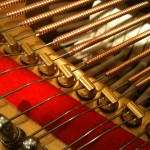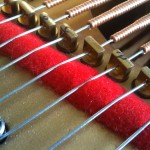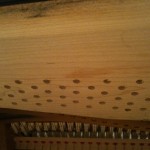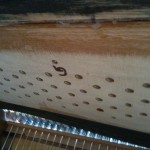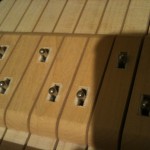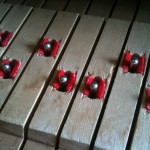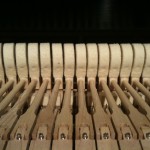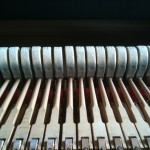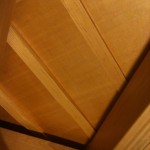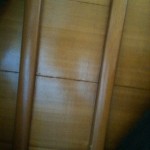Genuine Rebuilding by Experienced Craftsmen
When it comes to quality rebuilt pianos, it is important to consider where the work is done and who is doing it. Because we guarantee our rebuilt pianos to be genuine, we use genuine materials and only have our best craftsmen do the work.
These pictures point out some of the most important difference between our genuine rebuilt pianos and the typical “rebuilt” pianos offered by local piano tuners and online sellers.
Click on the photos to see more detail.
- These agraffes are properly installed and clean of any other markings. They will hold the string firmly in place, resulting in a very clear tone. Each note will stand out.
- Crooked and improperly seated agraffes will quickly cut through this low grade string. The sound will be bright in the showroom, but will become unpleasing. The marks on the agraffes were made with a Sharpie marker so the apprentice could keep track of which note they were working on.
- This view is with the action removed and looking up from the keybed. Notice how the wrestplank (pinblock) meets perfectly with the stretcher bar, effectively creating one solid piece off wood and a piano ready to withstand 40,000 pounds of string tension.
- Notice the epoxy used at the top of the frame to fill in the gaps between the aftermarket, low-grade wrestplank and the stretcher bar. Wrestplanks must be installed properly or the piano will not be stable. The writing on the block, and uneven drilling, is a sign that work was done by an apprentice. This is a little tricky to see, but a sure sign of a counterfeit Steinway.
- Steam was used to soften the glue holding the worn bushings to the keystick. Genuine felt is white, compared to lower grade red felt.
- The old key button felts were cut away instead of properly removed, which has permanently damaged the key buttons and key sticks. Notice the gashes around and cheap, aftermarket bushing felt, obvious by the difference in color compared to genuine on the left.
- Note the even hammer spacing and proper size hammers. The result is a warm, bouncy tone with lots of color.
- It’s impossible to tell if the hammer spacing is so uneven because of the parts used or because they were improperly installed. Notice the big gaps between the hammers? That’s because they’re the wrong ones for the piano. It has a bright, shrill tone.
- Perfectly restored board with no cracks.
- From the underside, cracks in the board are easily visible. From the top, they were filled with epoxy and covered with wood filler. Even we didn’t notice the cracks were camouflaged until we looked underneath.
